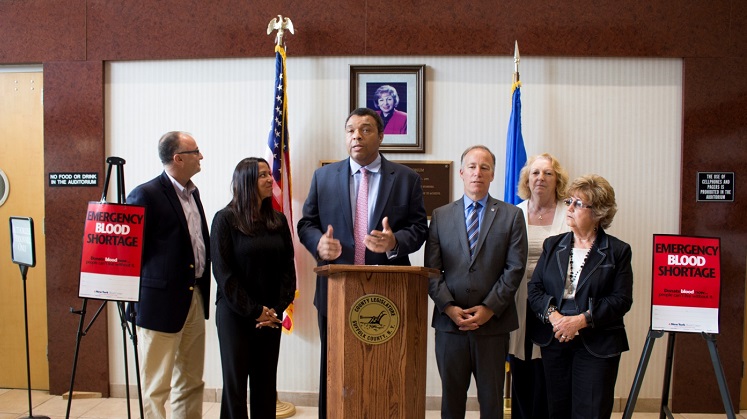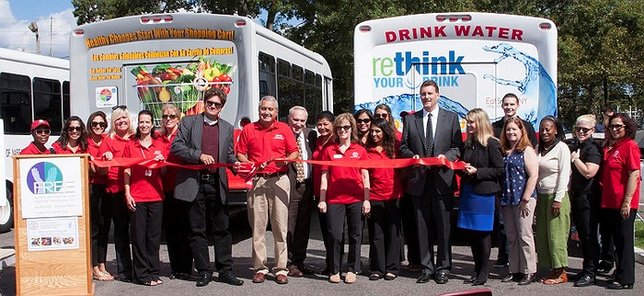Hauppauge, NY - June 24, 2016 - With the region facing an emergency blood shortage, Legislator William R. Spencer, MD stood with his colleagues and Long Island Blood Services last week to ask the public to give the gift of life at a nearby drive.
New York Blood Center (NYBC), of which Long Island Blood Services is a division, has declared an official blood emergency. The local blood supply has reached a critically low level with a less-than-two-day supply of B negative, A negative, and O negative blood, which is the type needed most readily in trauma situations and emergency rooms because it is the “universal” blood type. A seven- to nine-day supply is considered ideal.

Pictured: Legislator William Spencer, at podium with (from left to right) : 13th District Legislator Rob Trotta, 9th District Legislator Monica Martinez, Spencer, 10th District Legislator Tom Cilmi, 3rd District Legislator Kate Browning, and Susan Lingenfelter, business development manager at Long Island Blood Services.
“We are in the middle of a perfect storm of sorts,” said Legislator Spencer, who is a physician. “For one, blood supply tends to dip in the summer; 30 percent of donations in the Long Island region come from school-sponsored drives, and during the summer, we don’t have the same access to that community. Furthermore, we believe the Zika outbreak has contributed to a further dwindling of the blood supply, as travelers to Zika-prone countries must wait 28 days before giving blood.”
Recent national tragedies, like the mass shooting in Orlando, Florida are reminders that it is crucial for blood centers to have an adequately stocked blood supply on hand at all times so trauma patients can be properly treated.
“Having blood on hospital shelves in advance is key to saving lives,” said Legislator Spencer. “It takes 48 hours for donated blood to reach those who need it, as it must first undergo extensive testing before it is released to hospitals to ensure it is safe.”
“Blood is a very special thing,” added Susan Lingenfelter, business development manager at Long Island Blood Services. “We can’t manufacture it; we can’t transfuse it immediately. It has to be at the hospital when the patient arrives. That is why we encourage people to donate on a regular basis.”
Every 2 seconds, someone in the U.S. needs blood, according to America’s Blood Centers. Nearly 2,000 donations are needed each day in New York and New Jersey alone, NYBC reports.
“About one in seven admitted to a hospital will need a blood transfusion, and because blood has a limited shelf life, it is important that blood supplies are replenished on a continual basis,” said Suffolk County Legislature Presiding Officer DuWayne Gregory. “We ask everyone who is eligible to be proactive and to consider donating blood. With one selfless act, you can save multiple lives.”
Eligible donors include those who are at least age 16 (parental consent is required for 16-year-olds) who weigh a minimum of 110 pounds, are in good health and meet all Food & Drug Administration and NY State Department of Health donor criteria. People age 76 or older may donate if they have a doctor’s note on file with New York Blood Center or if they bring one on the day of the blood drive.
“By spreading the word or even hosting your own blood drive, inviting friends, family, and community organizations, you may save lives in your community,” said Andrea Cefarelli, executive director of NYBC. “We are in dire need of O negative blood with a reserve that is currently below a two-day supply, and that is just too low.”
Companies, organizations, and community groups are encouraged to donate or host their own blood drives to help rebuild the blood stock. In addition, NYBC offers an opportunity for high school and college students to earn up to $500 in scholarship money by hosting their own blood drive. This program developed to help students in the community and off-set the summer shortfall. To donate blood or for information on how to organize a blood drive, call 1-800-933-2566 or visit here.










